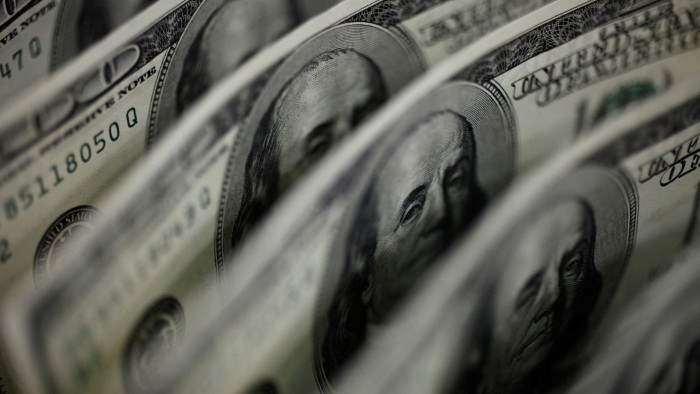Unlock the Editor’s Digest for free
Roula Khalaf, Editor of the FT, selects her favourite stories in this weekly newsletter.
The dollar slumped on Thursday and global stock markets dropped as investors rushed to price in growing damage to the world’s biggest economy from Donald Trump’s trade war.
The dollar fell 1.9 per cent against a basket of trading partners’ currencies, on track for its worst day since 2022, as investors fretted about lower growth from the president’s levelling of sweeping tariffs on US imports, and bet on faster interest rate cuts.
“It’s been a big sell-off for the dollar,” said Lee Hardman, senior currency analyst at MUFG. He said the decline had been driven by a more “stagflationary environment” in the US as tariffs feed inflation and hit growth, but also a reaction to “erratic” policymaking.
“[The tariffs move] is raising questions over investors’ confidence in policymaking in the US . . . playing into a short-term loss of confidence in the dollar,” he added.
Themos Fiotakis, global head of FX at Barclays, said US policy — which investors had hoped would be a combination of fiscal easing and selective tariffs — had resulted in “a blast of the US against everyone and that has to some extent created some loss of confidence”.
The declines came after the White House on Wednesday revealed sweeping 10 per cent tariffs on almost all US imports, and levies of 20 per cent on EU goods and 34 per cent on Chinese goods, on top of tariffs already announced.
On Wall Street, the S&P 500 fell 3.5 per cent by lunchtime in New York, piling further pain on a market that had already been pushed into a correction this year by Trump’s tariff threats and a sell-off in the technology sector. Banks, airlines and other economically sensitive stocks fell. The tech-heavy Nasdaq Composite dropped 4.6 per cent.
The Stoxx Europe 600 was down 2.7 per cent, with consumer cyclicals, financial and energy stocks among the big fallers as investors fretted about the economic fallout from tariffs against European nations, and their retaliation.
“It’s worse than expected, there’s no sugar-coating it,” said Zhikai Chen, head of global emerging market equities at BNP Paribas Asset Management.
Retailers Adidas and Puma were down nearly 12 per cent and 11 per cent, respectively, while banking group Standard Chartered lost 13 per cent.

“The trade war is a bit of a mess,” said Stephen Jen, chief executive of asset manager Eurizon SLJ. He said the shock would be “stagflationary for the US and elsewhere, and the financial markets will need to cope with this shock” until some of the tariffs are reduced.
Strategists said the scale of the dollar’s fall — with the currency failing to perform its traditional role as a haven in times of stress — reflected growing worries about US institutional strength.
“The US administration’s approach to calculating the tariffs raises serious concerns about policy credibility, undermining [the dollar],” said George Saravelos at Deutsche Bank.
The euro rose 1.8 per cent to $1.105, reaching its strongest level since October.
Elsewhere in global stocks, the UK’s FTSE 100 was down 1.6 per cent. Japan’s Topix closed 3.1 per cent lower and Hong Kong’s Hang Seng index fell 1.5 per cent.
Recommended
Markets were reordered according to the level of pain meted out by the new trade levies. Vietnam’s stock index was down almost 7 per cent, the worst-performing primary index tracked by Bloomberg, after the country was hit with a 46 per cent tariff, one of the largest.
The Japanese yen rallied 2 per cent as traders looked for protection amid the dollar’s fall.
Government bonds surged as investors looked for safety. Ten-year US Treasury yields fell 0.13 percentage points to 4.06 per cent as the price of the debt jumped.
Traders are now pricing in three or four quarter-point interest rate cuts from the Federal Reserve by the end of 2025 to shore up the US economy, up from three on Wednesday, according to levels implied by swaps markets.
“Even if tariffs are ultimately reduced by year-end, the near-term shock and associated uncertainty is likely to drive a near-term slowdown in the US economy and reduce full-year 2025 growth to closer to or below 1 per cent,” said Mark Haefele, chief investment officer at UBS Global Wealth Management.




